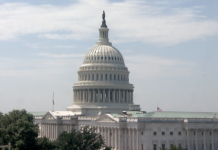
The federal public health emergency instituted during the pandemic made it easier for Georgians to access and keep insurance through Medicaid.
But with renewal up in the air, hundreds of thousands of Peach State residents face losing benefits altogether. Georgia’s congressional Democrats are urging the Centers for Medicare & Medicaid Services to do more to minimize the scope of lost coverage.
The public health emergency prohibits states from redetermining and disenrolling individuals from Medicaid while in effect — in exchange for enhanced federal funding.
In mid-April, the Biden administration extended the emergency status for another 90 days, but the future of the safety-net program beyond then is still under consideration.
Based on the latest enrollment data, about 2.3 million adults and children rely on Medicaid in Georgia for their health insurance.
In a letter to CMS, U.S. Sen. Raphael Warnock and others underscore the heightened reliance on the pandemic-era protections in Georgia and other states that have chosen not to expand Medicaid fully.
If the continuous coverage rule is eliminated, the Kaiser Family Foundation estimates upwards of 245,000 children and adults in the state could be yanked from Medicaid enrollment.
But state policy experts expect the actual number to be much higher, with even more people at risk of being lost in the bureaucratic shuffle of redetermining the eligibility of millions.
Continuous coverage during the pandemic has been a “lifeline” for Georgians, Democrats write, and warn that children are particularly at risk of losing coverage in non-expansion states.
“We cannot allow Georgians to go uninsured after surviving a global pandemic,” the letter reads.
Democrats ask that CMS require states to help residents transition from Medicaid to other sources of insurance so they aren’t lost in the redetermination process.
They also demand that states are “held accountable” if there is any mass disenrollment or substantial increase of uninsured patients.
The letter is signed by Warnock along with U.S. Sen. Jon Ossoff and U.S. Reps. Sanford Bishop, David Scott, Hank Johnson, Lucy McBath, Carolyn Bourdeaux and Nikema Williams.
In an interview with GPB, Warnock said he is hopeful that the pandemic subsides to the point that a state of emergency is no longer necessary, but that steps are taken to ensure Georgians aren’t left without insurance.
“Imagine having just throngs of people look up and discover that they have been disenrolled, that they had no coverage,” he said. “It’s a recipe for a different kind of public health disaster.”
Georgia’s Medicaid enrollment skyrocketed by about 24% from March 2020 when the continuous requirement started to December 2021, said Leah Chan, senior health policy analyst with the Georgia Budget and Policy Institute.
Chan’s estimates of potential dropoff are higher. She calculates that based on pre-pandemic disenrollment rates that around 150,000 non-elderly adults and over 300,000 children in Georgia are at risk of losing coverage.
“In Georgia, there’s also the risk that some may become uninsured and fall into that coverage gap,” she said. “Which is something that we experience here because we have not fully expanded Medicaid under the ACA.”
The Centers for Medicare and Medicaid Services outlined guidance that gives states 12 months to review whether or not people still qualify. State agencies face the monumental task of verifying each patients’ personal information.
Chan said if the state doesn’t get the transition right, people who might be eligible may fall off for procedural reasons — paperwork sent to the wrong address or renewals not returned in time.
“If they don’t have the resources they need to handle this volume, then that just increases the risk of folks becoming uninsured due to churn,” she said.
Warnock said he’s asking CMS to pay close attention to the process.
“I worry that without the proper tools and oversight as we come out of the public health emergency,” he said, “… it will be easier for states like Georgia that have not proven to be, at least as leaders, attentive to the needs of the uninsured will simply disenroll general throngs of people.”
The looming possibility of an end to the public health emergency and protected Medicaid benefits comes as the fate of Gov. Brian Kemp’s health insurance plans are still up in the air.
The Peach State is one of 12 states that have chosen not to expand Medicaid under the Affordable Care Act.
Georgia’s current eligibility level threshold is at or below the federal poverty line — that’s about $12,000 a year for an individual or about $21,000 a year for a family of three — rather than the full 138% under full expansion.
Peach State residents who make too much to qualify for Medicaid but not enough to be eligible for subsidized coverage in the insurance marketplaces — or may not be able to afford it — fall into the coverage gap.
Kemp offered his own partial expansion plans through Medicaid waivers initially submitted and approved under the Trump administration. But the plans have been put on hold by President Joe Biden.
Georgia’s budget will also take a hit if the public health emergency requirement is ended because states will lose the 6.2% enhanced federal match.
This article appears on Now Habersham in partnership with GPB News







